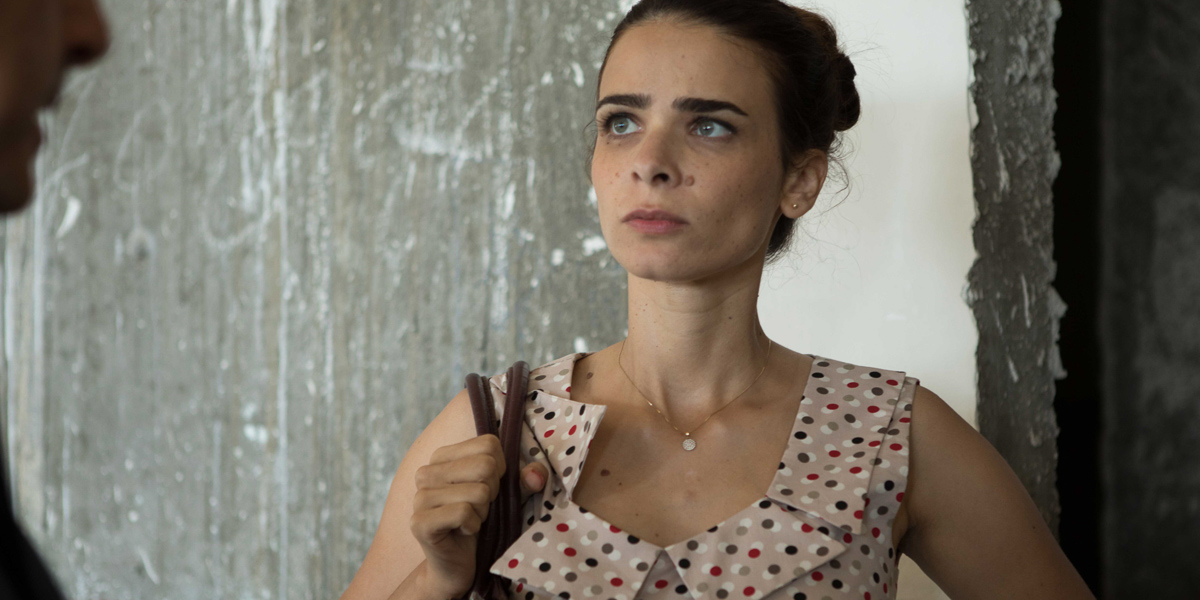Working Woman review: A detailed and terrifying effigy to the realities many women face.

Image credit: Courtesy of TIFF
Working Woman review [TIFF]
Orna is full of life and optimism at the start of her new job in real estate. Eager to bring something potentially more stable to the table for her three children and dream-seeking new restaurant owner partner, she is only thrilled when her new boss, Benny, recognises her from military service and hires her at his big-time company.
She and us could almost miss the first red flag. A co-worker questions why she is working so closely with Benny, the head when it is only her first foray into real estate. What follows is that telling cinematic inhale – the slightest elongation of silence between this comment and the next. Orna’s gaze: still and bereft of any suspicion, only a little shyness. Benny: already reaching between them, drawing the commenter away by the shoulder, interrupting, moving things along brusquely before they can be examined too closely for ill-intent.
The saddest thing is that Orna proves she deserves her place. Capable, outgoing, and efficient: she visibly brings in new clients and new ideas, sending emails for meetings she conceptualised 2 weeks in advance, and juggling her children’s cry for attention with overtime hours.

Image credit: Courtesy of TIFF
It’s fitting how Benny then chooses the middle of the construction site, as the flat complex rises, to start his swift deconstruction of another kind of surface. Under his hand, down must fall the neat wall of detached professionalism that sits between colleagues, between bosses and assistants. Down it must come, brick by brick, every time. Lingering for one moment in the shadows of a doorway, he stops her to tell her, apropos of nothing, that she would look better with her hair down. As innocuous a comment as it might seem, it suggests everything. The healthily detached gaze of a work partner, with all its incomplete interest in the personal and all its complete reverence for the job — that ideal, artfully distracted eye towards the goal of the company — becomes riddled with devices that she will from now on have to try and avoid: objectification is the only the trap door, down in the darkness below it lies the nastier things that would follow her polite, but unflattering refusal of it — offense, dislike, aggression — down in the places where ‘difficult’ women stay tumbling.
Preference reeks of possession.
The micro-aggressions only continue from there. She must wear a ‘nice’ skirt to a meeting she set up with French clients: modest, but attractive. She can’t go home yet, he has ordered them dinner to the office. He’ll turn the lights off and stand, silently, in the space between her desk and the door until she promises to stay. Women know this game well; most have been forced to play. Unwanted jokes melt into prickliness melt into the most sinister barbs they’ll ever have to touch.
When he does force a kiss on her one evening after the meeting, her hurt as she storms home is heartbreaking. Her dream of the perfect new job, her own excelling from the sheer brunt of her hard work and focus, and a better future for her children is tarnished. And as her husband’s financial struggles with his up and coming restaurant coincide with Benny’s glowing praise, and growing intensity around Orna, she finds herself forced into the line of fire to provide for her family.
There’s a scarce use of score as a tension building motif, and little drama is made of the worsening incidents. Like a slow-burn horror flick, they happen swiftly and quietly, hastily buried beneath the weight of Orna’s other responsibilities. These editing and directorial choices are the truest reflections of how deadly these quiet decisions are. How they are conceived outside of the realm of the victim’s control and knowledge, and how they can so swiftly rupture one’s psyche and sense of posture in the world; striking deep in the night like a turning knife. Only the lighting gives us a clue: the warm, honeydew hues of the house where she hangs out with her family giving way to the bleak, whitewashed tones of the offices. Benny may be fixated but there’s no real warmth there.

Image credit: Courtesy of TIFF
Lead actress Liron Ben Shlush is left to bring the intensity of the ordeal to the forefront. Where the rest of the world Aviad has built is quiet and fashioned with spooky blankness around her (almost like everything is watching, in the stillness, like a thousand acres of static witnesses) Avadet crumbles with dignity. Her Hepburn-like face carefully carries the myriad of emotions Orna contemplates, somewhat maneuvering the line between sickly unnerved and cooly determined to see her career through. It is a performance of our times; the cold shock, pain, and anger of #Metoo and #Timesup made flesh.
It’s not a showy film, for the most part, the damning is in the small, masterfully presented details; Benny’s lingering too long in-frame, the slightest flinch from Orna as he enters a room, the tone of his voice when she doesn’t play along. Presented, in pulse-raising assured synchronicity like this, they reflect the larger issue that women’s gut will tell them is oncoming from the first dodgy look. When the worst does happen, through the excruciating hush of it, audiences will realise these tiny hints were the path, and that they were shouting through the silence.
Without restraining any of the anger or the sorrow of the narrative, the film finds that its hero, Orna, has a rebuttal. An unspoken dignity, that turns out to be just as loud.
Working Woman is a story of a people, for a people. May this story continue to be told until no one can ignore it; from all angles, from all settings, and preferably from well-financed female directors also. May it always be told this truthfully. May it be told as extensively as it has happened.
An intelligent and masterful whistle-blowing of the ways in which powerful men use long-game coercion and professional statuses violently, to achieve violent things. But also, most vitally, a telling of survival, and of one woman, and many women’s, truth.
Working Woman review by Abi Silverthorne, September 2018.
Working Woman was reviewed at the 2018 Toronto International Film Festival. Click here for all of our coverage.

Latest Posts
-


Film Trailers
/ 53 mins ago‘Daddio’ trailer: Sean Penn and Dakota Johnson lead the cast
The film will stateside in June.
By Paul Heath -


Film News
/ 1 day agoPrince Naseem biopic on the way titled ‘Giant’ – Pierce Brosnan to co-star with Amir El-Masry
AGC Studios and BondIt Media Capital are financing the film.
By Paul Heath -


Home Entertainment
/ 1 day ago‘Bob Marley: One Love’ – confirmed home release details
Available to buy from April 22,2024 or rent on May 6.
By Paul Heath -


Film Trailers
/ 4 days agoNew UK trailer for French drama ‘Rosalie’
The film played in Un Certain Regard at last year's Cannes.
By Paul Heath














